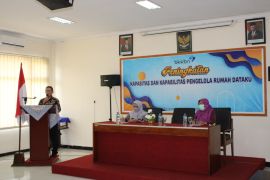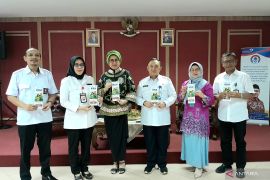If a family has many children, (and) only one person works--just the father, for example--while others are dependents and cannot work, that is…actually a demographic disaster.Jakarta (ANTARA) - The number of children born to a married couple could affect the quality of their family in terms of their physical or mental health, the National Population and Family Planning Agency (BKKBN) has said.
“If a family has many children, (and) only one person works--just the father, for example--while others are dependents and cannot work, that is not a demographic bonus. This is actually a demographic disaster," BKKBN Head Hasto Wardoyo said in a written statement here on Monday.
The current social conditions are very different compared to the past, he pointed out. The idea that many offspring support sustenance is no longer valid and must be dismissed because having more than one or two children in a family cannot be considered a demographic bonus.
This is because it can only be counted as a demographic bonus if it results in a family's prosperity. This means that the number of productive family members must exceed the number of unproductive members.
A higher number of children also increases the risk of stunting. Stunted children experience growth failure due to malnutrition and repeated infections due to an unsupportive environment. This condition impacts children until they grow old.
Related news: IUDs pose no threat to maternal health: BKKBN
The detrimental effects of having more offspring can be seen in Siderang Legok village, Cintanagara sub-district, Cigedug district, Garut district, West Java, which has been dubbed the ‘Village of Many Kids.’ The majority of its residents work as seasonal farmers, and each family, on average, has more than 10 children.
As a result, the rate of childhood stunting in the area is quite high. The village has bumped the stunting rate in West Java province beyond 24 percent, putting West Java on the list of 12 provinces with the highest stunting prevalence in Indonesia due to the large number of children in one family, short intervals between births, and early marriage.
"(According to) data obtained by the agency during the COVID-19 pandemic, (the incidence of) early marriage in West Java has increased. Early marriage leads to higher risk of maternal and infant mortality as well as babies born in stunted condition due to insufficient nutrition during pregnancy," Wardoyo informed.
He deemed it necessary for families to adopt a new paradigm through the Family Planning program. People need to understand that family planning is not limited to the use of contraceptives, but also planning for a smart and healthy future generation.
Related news: Early marriage can raise maternal, infant mortality: BKKBN
The government is implementing Presidential Instruction Number 3 of 2022 about High-Quality Family Villages as part of efforts to create independent, peaceful, enduring, healthy, and peaceful families.
"Therefore, I expect that the West Java government will constantly maintain its support for non-state civil servants family planning instructors," Wardoyo remarked.
Related news: BKKBN educates adolescents about stunting through Elsimil app
Related news: Greater empathy in informing about family planning: BKKBN
Translator: Hreeloita D S, Mecca Yumna
Editor: Fardah Assegaf
Copyright © ANTARA 2022












